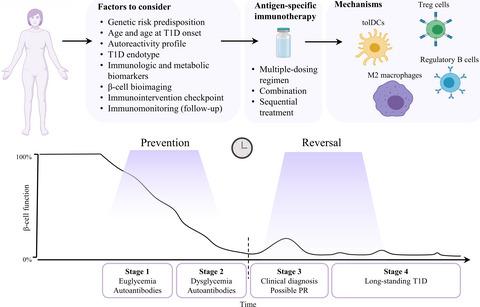当前位置:
X-MOL 学术
›
Immunol. Cell Biol.
›
论文详情
Our official English website, www.x-mol.net, welcomes your
feedback! (Note: you will need to create a separate account there.)
A century later, still fighting back: antigen‐specific immunotherapies for type 1 diabetes
Immunology and Cell Biology ( IF 3.2 ) Pub Date : 2021-01-22 , DOI: 10.1111/imcb.12439 Silvia Rodriguez-Fernandez 1, 2 , Lidia Almenara-Fuentes 1, 2 , David Perna-Barrull 1 , Bruna Barneda 2 , Marta Vives-Pi 1, 2
Immunology and Cell Biology ( IF 3.2 ) Pub Date : 2021-01-22 , DOI: 10.1111/imcb.12439 Silvia Rodriguez-Fernandez 1, 2 , Lidia Almenara-Fuentes 1, 2 , David Perna-Barrull 1 , Bruna Barneda 2 , Marta Vives-Pi 1, 2
Affiliation

|
Type 1 diabetes (T1D) is a chronic metabolic disease caused by the autoimmune destruction of insulin‐producing β‐cells. Ever since the 1920s, the fate of patients suffering from T1D was dramatically improved owing to the isolation and production of insulin, and the scientific field has largely progressed as a result of the evidence gathered about its underpinnings and mechanisms. The last years have seen this knowledge transformed into actual antigen‐specific immunotherapies with potential to restore selectively the breach of tolerance to β‐cell autoantigens and halt the autoimmune aggression. However, so far, the results of both prevention and reversion trials in T1D have been rather discouraging, so there is still an urgent need to optimize those immunotherapies and their associated factors, for example, posology and administration patterns, route and timing. In this review, we look back on what has been achieved in the last century and identify the main autoantigens driving the autoimmune attack in T1D. Then, we take a deep dive into the numerous antigen‐specific immunotherapies trialed and the ones still at a preclinical phase, ranging from peptides, proteins and agent combinations to gene transfer, nanoparticles, cell‐based strategies and novel approaches exploiting naturally occurring tolerogenic processes. Finally, we provide insight into the several features to be considered in a T1D clinical trial, the ideal time point for intervention and the biomarkers needed for monitoring the successful regulatory effect of the antigen‐specific immunotherapy. Although further research and optimization remain imperative, the development of a therapeutic armamentarium against T1D autoimmunity is certainly advancing with a confident step.
中文翻译:

一个世纪后,仍在反击:针对 1 型糖尿病的抗原特异性免疫疗法
1 型糖尿病 (T1D) 是一种由产生胰岛素的 β 细胞的自身免疫性破坏引起的慢性代谢性疾病。自 1920 年代以来,由于胰岛素的分离和生产,T1D 患者的命运得到了显着改善,并且由于收集了有关其基础和机制的证据,科学领域取得了很大进展。过去几年,这些知识转化为实际的抗原特异性免疫疗法,有可能选择性地恢复对 β 细胞自身抗原的耐受性破坏并阻止自身免疫攻击。然而,到目前为止,T1D 的预防和逆转试验的结果都相当令人沮丧,因此仍然迫切需要优化这些免疫疗法及其相关因素,例如剂量学和给药模式,路线和时间。在这篇综述中,我们回顾了上个世纪取得的成就,并确定了驱动 T1D 自身免疫攻击的主要自身抗原。然后,我们深入研究了大量试验过的抗原特异性免疫疗法和仍处于临床前阶段的疗法,从肽、蛋白质和药物组合到基因转移、纳米颗粒、基于细胞的策略和利用自然发生的致耐受过程的新方法. 最后,我们深入了解了 T1D 临床试验中要考虑的几个特征、干预的理想时间点以及监测抗原特异性免疫疗法成功调节效果所需的生物标志物。尽管进一步的研究和优化仍然势在必行,
更新日期:2021-01-22
中文翻译:

一个世纪后,仍在反击:针对 1 型糖尿病的抗原特异性免疫疗法
1 型糖尿病 (T1D) 是一种由产生胰岛素的 β 细胞的自身免疫性破坏引起的慢性代谢性疾病。自 1920 年代以来,由于胰岛素的分离和生产,T1D 患者的命运得到了显着改善,并且由于收集了有关其基础和机制的证据,科学领域取得了很大进展。过去几年,这些知识转化为实际的抗原特异性免疫疗法,有可能选择性地恢复对 β 细胞自身抗原的耐受性破坏并阻止自身免疫攻击。然而,到目前为止,T1D 的预防和逆转试验的结果都相当令人沮丧,因此仍然迫切需要优化这些免疫疗法及其相关因素,例如剂量学和给药模式,路线和时间。在这篇综述中,我们回顾了上个世纪取得的成就,并确定了驱动 T1D 自身免疫攻击的主要自身抗原。然后,我们深入研究了大量试验过的抗原特异性免疫疗法和仍处于临床前阶段的疗法,从肽、蛋白质和药物组合到基因转移、纳米颗粒、基于细胞的策略和利用自然发生的致耐受过程的新方法. 最后,我们深入了解了 T1D 临床试验中要考虑的几个特征、干预的理想时间点以及监测抗原特异性免疫疗法成功调节效果所需的生物标志物。尽管进一步的研究和优化仍然势在必行,











































 京公网安备 11010802027423号
京公网安备 11010802027423号